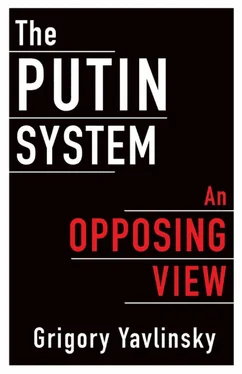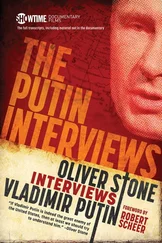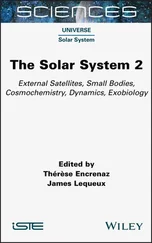The task of bringing this message home to ordinary people has been given to government-controlled media (first and foremost, federal TV broadcasters), educational establishments, the loyalist part of the Russian Orthodox Church, and non-Orthodox religious leaders. The task has been made easier by the increasing political and military confrontation with the West and by the inevitable concomitant growth of resentment and militaristic sentiment in public debate and the general atmosphere.
It is essential to keep in mind that these highly destructive elements of marginal thinking have been brought to the fore by the top authorities—by their conscious decision, which they falsely portray as a response to popular demand. In fact, the opposite is true: it is official and semi-official brainwashing that is poisoning the public with reactionary and obscurantist notions and attitudes, which the authorities then use to justify their rejection of European values and the modern concepts of self-ruled civil society.
The second notable change of recent years is the system’s strong advance toward ridding itself of elements intrinsically alien to autocracy, such as political party pluralism, popular elections as a means of selecting people to fill government positions, or any instruments of external control over the activities of government officials. Since the last parliamentary elections, in 2016, Russia’s media has visibly lost interest in party politics or elections to local legislative assemblies—the only venue that would give sense to political party activities, if those assemblies had any say in governing local affairs, which they seem to have lost.
The presidential election of 2018, if compared to previous elections, also marked one further step toward eliminating the air of competition among candidates. The election was designed and staged as a plebiscite, that is, as a confirmation of overwhelming public support for the only meaningful candidate worthy and capable of ruling the country, and for the system he embodies. It was planned by Putin’s people that all the other candidates would be portrayed as showmen of sorts, recruited to make the event look a little bit colorful and amusing, with almost all of the participants playing by the book written by the presidential agencies in charge of the event.
In fact, these elections turned out to be an open demonstration of the understanding that Vladimir Putin derives his legitimacy not from the free choice of Russian citizens but by making them renounce their role in making key political decisions, including the choice of policies, in favor of the supreme leader, whom they cannot change but are invited to approve without debate or deliberation.
And yet I participated in the election, the plebiscite. Why, if the result was obvious from the start? Because, after nearly thirty years in Russian politics, I felt obliged to tell 110 million Russian voters what was really going on in the country. My task was not just to inform people about what was going on (in fact, the internet can do this perfectly, at least for those who truly want to be informed) but also to present an agenda for public debate and discussion, which would include issues that could be regarded as the most important for the future of the country.
These debates could not ignore the tens of thousands of victims of the war in Eastern Ukraine; the responsibility for the downing of a passenger Boeing in July of 2014; Ramzan Kadyrov’s arbitrary rule in Chechnya, with its disrespect for human and civil rights; the annexation of Crimea; the war in Syria; or international economic sanctions.
The debates also should cover earlier events that formed Putin’s political agenda, such as the second war in Chechnya, which helped him to attain the highest power; the terrible terrorist acts in Dubrovka and Beslan, which were not subject to thorough investigation, and the unprofessional actions of the authorities, which were responsible for the deaths of hundreds of hostages; the failure to bring to justice the murderers of many independent journalists, such as Yuri Shchekochikhin and Anna Politkovskaya; and the assassination of Boris Nemtsov.
Finally, public debate should not ignore the defeat of the Russian economy as a result of flaws in Putin’s domestic and foreign policies, the issue of mass poverty, or the complete nondelivery on authorities’ promises.
My participation in the presidential election campaign, despite the fake nature of the proceedings, gave me an opportunity to discuss these issues at mass meetings with voters, to make my ideas heard by millions of people during TV debates, and to present them in my campaign materials. It may very well be that this was the last opportunity to deliver on a national scale such messages about the plight of the country and to propose remedies to avert the looming crisis. I felt obliged to use this last chance. Television stations and other mass media controlled by Putin’s system were opened to opposing views for only a short period during the official election campaign, and I reasoned that this short period of open opportunity should be utilized to its fullest.
The number of votes I gathered, according to official results, was rather small. Nevertheless, I am sure that I succeeded in planting in the minds of millions of my fellow countrymen the seeds of serious deliberation on their future and the future of their children, and I am sure that, in time, these seeds will grow and Russia will return to the path of freedom.
The official results of the 2018 elections could hardly be interpreted as active support of Putin’s rule by the majority of the population, but they are and will be used by the authorities as evidence that Russia’s people see no alternative to this rule. This could become a sort of milestone on the way to transforming the current authoritarian regime into a postmodern totalitarian system, if the authorities choose to proceed in this direction.
The third marked change that we have witnessed during the past three years is the system’s increased personalism, by which I mean the elimination of any checks on the personal power of the top man in the state’s command hierarchy. As a result of years of devolution, the system now consists of no institution or position that could possibly exercise control over decisions made by the top ruler, something like the Soviet-era Communist Party Politburo. Since recovering his presidential post in 2012, Vladimir Putin not only has exercised rigid control over all branches of government, including its legislative and judicial bodies, but also has deprived consultative bodies like the Security Council of the ability to influence key decisions, which are developed and finalized at Putin’s own discretion. The process of decision-making has been closed to both the general public and the members of the political establishment, who, like the general public, seem to have few available sources of related important information. In terms of policy-making and policy debate, the bodies of the formally ruling United Russia Party have turned into the same kind of phantom institutions as the “opposition” parties represented in parliament.
Finally, it could be argued that recent developments have made it nearly impossible for external actors to influence political decision-making or political activities in Russia. On the one hand, this is the result of the actions of the Russian authorities, who strove to limit such possibilities through more far-reaching and exhaustive regulation and restriction of foreign actors in all social and public activities inside Russia. A growing number of nongovernmental organizations and media outlets with foreign participation or sponsorship have been subject to strict control, overt trolling, or outright bans on their activities. As the authorities gradually abandoned the idea of maintaining a good reputation with Western or Western-dominated international institutions, those organizations lost both direct and indirect leverage with regard to Russian activities and behavior.
Читать дальше












